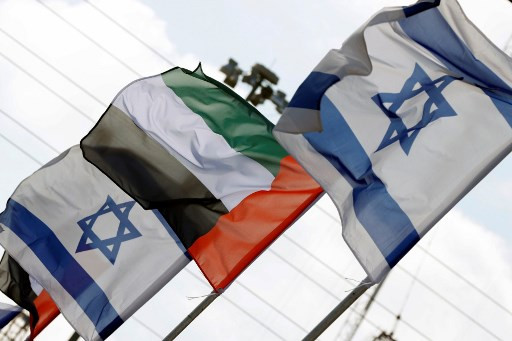Popular Reads
Top Results
Can't find what you're looking for?
View all search resultsPopular Reads
Top Results
Can't find what you're looking for?
View all search resultsIsrael-UAE conundrum
This warming of ties between Arab countries and Israel will certainly pose a challenge as to how Indonesia conducts its diplomacy in the region, especially because Indonesia continues to support the struggle of the Palestinian people.
Change text size
Gift Premium Articles
to Anyone
T
he deal signed by Israel and the United Arab Emirates (UAE) is emblematic of the topsy-turvy world in which we currently live. The deal, which would allow for the normalization of the Jewish state of Israel and an Arab nation like the UAE, is important on so many levels, yet key architects of the deal, people like Israeli Prime Minister Benjamin Netanyahu and US President Donald Trump’s son-inlaw Jared Kushner, are so lacking in any moral authority that we automatically suspect that some sinister motives lie behind it.
But whatever the ulterior motives of everyone involved (Netanyahu needed this deal to shore up his slumping popularity from a corruption scandal), the fact of the matter is that the normalization agreement between Israel and the UAE is a major milestone in Middle Eastern politics. The last time an Arab country signed such an agreement was when Jordan signed a peace treaty with Israel in 1994.
And other Arab states appear to have warmed to the idea that Israel is no longer the enemy. Following the first commercial flight from Tel Aviv to Abu Dhabi, Saudi Arabia announced on Wednesday that it would allow any flights going to and from the UAE to fly over its territory, a decision that would give Israel access to the kingdom’s airspace.
If the concern was that with this deal, the plight of the Arab Palestinians would be further sidelined from discussions, UAE officials vowed that the deal would immediately stop Netanyahu’s threat of annexation of the West Bank and what could be considered as potential for further escalation.
It is also likely that the Israeli-UAE deal will open the door for a rapprochement in the Middle East. Even before this deal, Israel had a good relationship with Oman, and behind closed doors it is very likely that other countries in the region — especially those seeking to contain Iran — have some kind of ties with the Jewish state. But whatever the geopolitical considerations, diplomacy wins in the end.
This warming of ties between Arab countries and Israel will certainly pose a challenge as to how Indonesia conducts its diplomacy in the region, especially because Indonesia continues to support the struggle of the Palestinian people. The Israeli-UAE deal puts Indonesia in a tight spot, given the good relationship the administration of President Joko “Jokowi” Widodo has with the UAE.
If anything, the UAE has been Indonesia’s closest partner in the Middle East. Last year, during a meeting at the Bogor Presidential Palace in West Java President Jokowi appointed Abu Dhabi Crown Prince Sheikh Mohamed Bin Zayed to chair the steering committee for the US$34 billion new national capital in East Kalimantan.
Diplomacy has always been about finding the right balance among competing interests and the challenge now for Indonesia is how to balance its interest in finding partners to help it create growth and prosperity while at the same time fighting for basic human rights for the Palestinian people.










